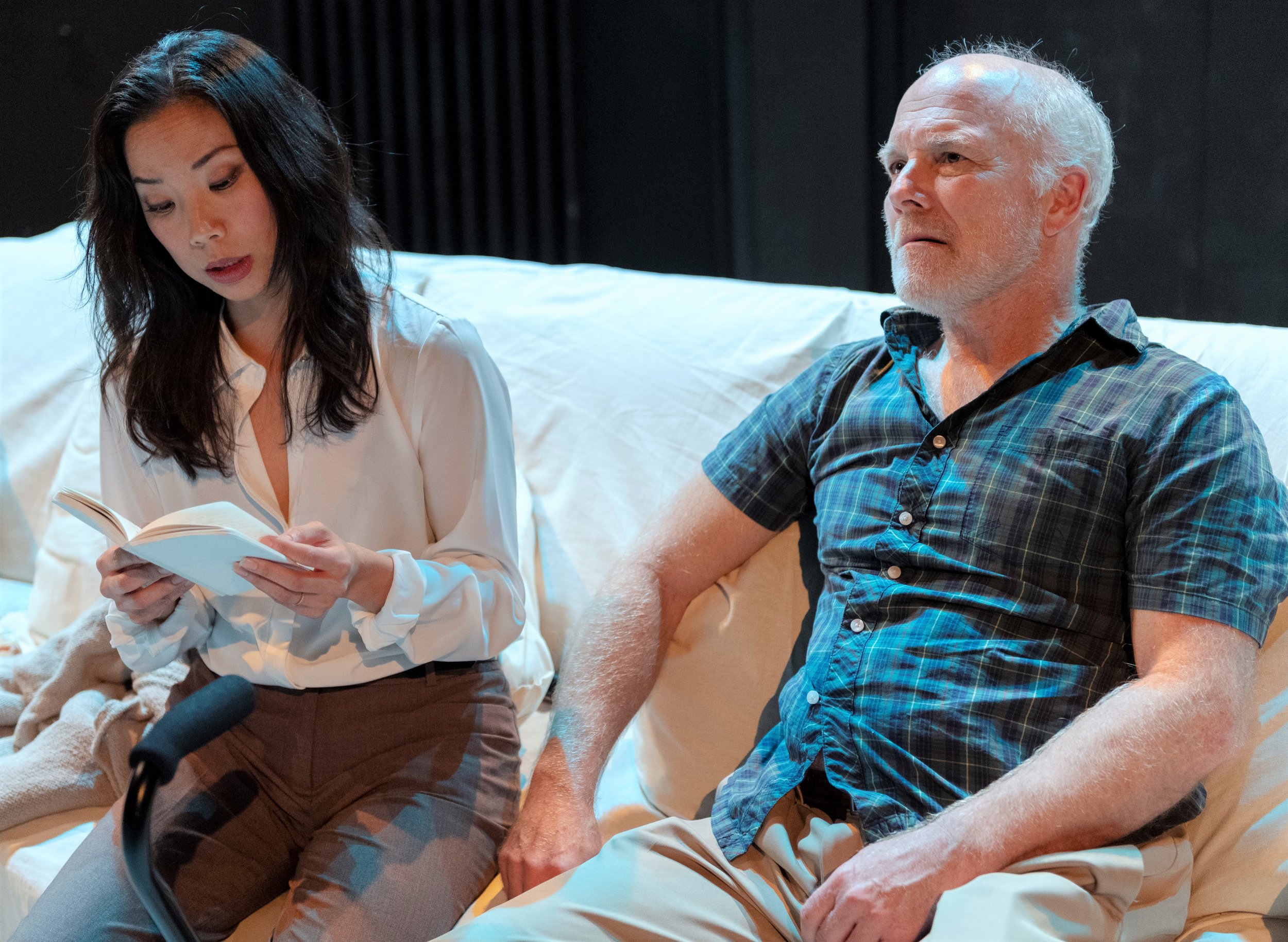It’s a fallacy that addiction can be cured by a stint in rehab. Anyone celebrating sobriety can affirm that the process of recovery takes decades—and is often lifelong. Nevertheless, a rehab experience can trigger a life-changing awakening. This unpredictable process is at the center of Spike Manton and Harry Teinowtiz’s Another Shot, a poignant exploration of Teinowitz’s alcoholism and treatment. Director Jackson Gay keeps the play teetering between denial and acceptance, and between comedy and tragedy.
Beautiful Day Without You
Origin Theatre Company, established in 2002, is dedicated to presenting American premieres of works by European writers. Origin’s current production, Beautiful Day Without You, is a commissioned play by Marco Calvani. Primarily known in Italy, Spain, and France, Calvani is an actor, director, and playwright, and he has collaborated several times with playwright and provocateur Neil LaBute. Beautiful Day Without You is Calvani’s first full-length play in English.
Directed by Erwin Maas, the play treats a number of contemporary issues in the U.S., including racism, homophobia, drug use, and the limitations of the health care system. Emphasizing the racial and gender divisiveness metaphorically, the play is framed by the specter of a dead puny dog of mixed breed (and awaiting an autopsy in a refrigerator’s salad crisper) and an offstage Doberman, a powerful purebred descended from notable European lineage and described as “supreme breed.” There are also a few shocking twists and more than a few scabrous epithets along the way to the unconvincing conclusion. In short, this is Neil LaBute territory with even less subtlety.
Richarda Abrams (left) plays Janet Blount, an out-of-work nurse, and Anne Son is Rachel Huang, an animal control officer, in Marco Calvani’s Beautiful Day Without You. Top: Son with Dan Butler, who plays Bob Sacco, a belligerent Doberman owner.
Bob Sacco (Dan Butler) proudly boasts of his white European ancestry and is the owner of Blaze, the “supreme breed” Doberman. Blaze is accused of killing Pippi, a small mongrel dog, owned by Janet Blount (Richarda Abrams), an African American, out-of-work nurse. The hot-tempered and alcoholic Bob claims to have no recollection of the incident, and Janet, who calls the deceased animal her “baby,” apparently took the animal home after the attack rather than to a veterinary hospital. In just one of many implausible plot points, it is only after Bob refuses to take responsibility for his dog’s actions that Janet threatens to call the police.
Rachel Huang (Anne Son), an Asian-American lesbian (all of the characters’ individual identities are underscored in the play) is the animal control officer assigned to investigate the case. As the play progresses, the trio develop an unlikely codependent relationship. Bob has a stroke, Janet becomes his nurse, and Rachel finds support and assistance from the other two in helping to cope with her heroin-addicted wife.
The connections joining the characters are tenuous at best, and the play lacks satirical bite and caustic social commentary. That said, Calvani deserves credit for tackling pressing cultural issues in the U.S. They seem to derive, however, from the perspective of an outsider, one who hasn’t been steeped in America’s boiling identity politics. For instance, quotidian racism and homophobia, except when addressed by neo-Nazis and white nationalists, tend to be insidious in their carefully contained subtext and in deep-rooted discriminatory practices. Here, bigotry and bias are expressed openly and carelessly. For instance, Rachel overtly refers to Janet and other African Americans as “you people”; Janet points to Saint Paul in the Bible for justifying her attitudes toward homosexuality; and Bob describes a presumably effeminate dog with an anti-gay slur and bemoans the rise of African American fraternities at Northwestern. Ranting about the changing demographic in the Chicago suburb, he says:
When we moved here this neighborhood used to be so close-knit, quiet, harmless. I mean, look at it now! I swept my sidewalk only yesterday and go look at it now! A disaster, junk everywhere! They are dirty, loud, lazy. And most of all they are poor! I don’t know how it happened but somehow we became less and less and less!
Janet (Abrams) nurses a stricken Bob (Butler). Photographs by Deen van Meer.
The characters and their devotion to one another come across not as simply insensitive but borderline psychopathic.
Maas’s direction does not mitigate the play’s tilt toward overstatement. The evening begins (and ends) with the three actors jogging in place and picking up the pace to a fevered sprint. The mad dash and heightened emotions rarely slow down enough to let the audience take a breath, and the evening becomes rapidly enervating.
As the emotionally on-edge Bob, Butler (the bullying Bulldog from television’s Frasier) is aggressively forceful, but he injects his performance with a few moments in which he reveals vulnerability as well as abject grief over the death of his wife. Blount, as the financially struggling nurse with her own family problems, holds her own against her belligerent neighbor. Son’s character is the least fully drawn, but she too has some nice moments as she exposes the character’s efforts to keep personal issues out of her professional life.
Guy De Lancey designed the set, lighting, and costumes. The entire theater, including the floor and audience seats, is draped in white painter’s canvas. The impression is that of a liminal space, a world somewhere between earth and heaven, art and reality, and being and becoming. Regrettably, this is a play that would have been more effective if it were grounded in the here and now.
Beautiful Day Without You plays through Nov. 25 at the West End Theatre (263 West 86th St.). Evening performances are at 8 p.m. Tuesday through Saturday; matinees are at 3 p.m. Sunday. There are no performances on Nov. 21 and 22, but there is an added matinee at 3 p.m. on Saturday, Nov. 24. Tickets range from $35 to $65 and can be purchased by calling (866) 811-4111 or visiting origintheatre.org.










